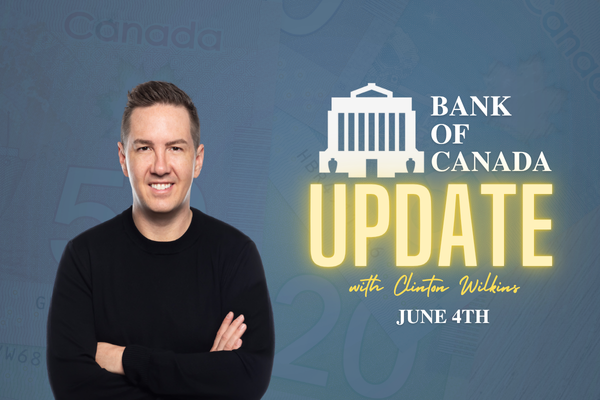Clinton Wilkins joins Todd Veinotte on 95.7 News Radio to discuss The Bank of Canada holding its key policy rate at 2.75%, marking the first pause after seven consecutive cuts.
Rick Howe: The home buying process
More about the home buying process
Home Buying Process. Don’t feel like listening? Check out the audio transcript below.
This is a five-minute business builder with Rick Howe, where your business comes first, on News 95.7.
Talking a bit more about the home buying process
Rick: [00:00:08] Well, every now and again, we invite members of the local business community to join us to give us an update on how things are going. And with us here this afternoon is senior mortgage advisor Clinton Wilkins. Good afternoon, Clinton.
Clinton: [00:00:20] Thanks for having me, Rick.
Rick: [00:00:21] How are you doing?
Clinton: [00:00:22] I’m doing just great. It’s Thursday. Great day.
Rick: [00:00:24] It is indeed. I saw you at the TV news the other night talking about the ongoing delays, I guess, with the bridge work over the MacDonald Bridge in some of the impact.
Bridge delays
Clinton: [00:00:33] Yeah. And it definitely impacts us because we’re directly beside the MacDonald Bridge and we kind of use that as a landmark. People ask where our office is and we say that it’s at 99 Wyse Road, right beside MacDonald Bridge. So, we definitely lived through some of the closures in the past. And you know, they’re definitely going back to the table and doing some more now. And we take our last clients in at 6:00 because we really think that having that flexibility in terms of scheduling is important
Rick: [00:00:58] Sure.
Clinton: [00:00:58] But with a bridge closure at 7:00, that means we really need to get them out at like 6:30, 6:45. Otherwise, it can be a long commute home.
Rick: [00:01:06] But again, it’s just a temporary thing.
Clinton: [00:01:07] It’s just temporary. And hopefully it will be all done and then life will be good and we’ll continue along.
Rick: [00:01:12] Yes, indeed. But you’re here today not to talk about the bridgework, but to talk about the home buying process.
The Home buying process
Clinton: [00:01:18] And I think the process is so important Rick. You’ve bought homes. I’ve bought homes. And I think if you haven’t gone through the process before, you know, it sometimes can be daunting. It’s the biggest purchase of people’s lives. Homeownership is part of the Canadian dream. I think that is very realistic here in Halifax and we’ve talked about that before. And I think just going through the process and knowing what the different steps are and who to have on your team is just so, so important.
Rick: [00:01:41] Do you need a lawyer?
Clinton: [00:01:43] Every purchase transaction requires a lawyer in the province of Nova Scotia and actually in every province across the country, a lawyer is required to register the deed. And in our case, register the mortgage charge when it’s a purchase,
Rick: [00:01:55] Even a private sale?
Clinton: [00:01:56] Even a private sale and private sale, you need a lawyer even more than you do on a regular MLS listed property.
Rick: [00:02:01] Yeah, why?
Clinton: [00:02:02] Because in a private sale, the lawyer would draft up the purchase agreement to make sure that it’s good and binding.
Rick: [00:02:07] OK.
Your lawyer’s role
Clinton: [00:02:08] And that’s required to obtain mortgage financing. All right. So lawyer super, super important. And I think, you know, at the end of the day, in real estate, the law is very transactional. But when it’s the biggest purchase of your life, you want to make sure you’re protected.
Rick: [00:02:22] And you’re right. It is daunting. We’re into our second home now. We bought an additional home. And thankfully, my wife carried the weight because I was just kind of lost I mean with the paperwork, with the things you’ve got to know.
Clinton: [00:02:35] You showed up and sign the papers.
Rick: [00:02:36] Yeah, well pretty much.
Clinton: [00:02:37] But there needs to be some champion driving that process.
Simplifying the process
Rick: [00:02:39] Yeah. So tell me about that process. Again, it may be daunting, but, you know, when push comes to shove, you’ve got people like yourself. Exactly. Living ahead.
Clinton: [00:02:48] And we love holding the hands of consumers. And I think especially when you’re a first time homebuyer, you need to have an advocate that’s going to be in your corner to make sure that you are protected and the transaction goes smoothly and you’re getting the best deal. And I really think the very first step is getting a pre-approval and that’s where we come into play.
Rick: [00:03:04] OK. Tell me, what is a pre-approval?
It starts with a pre-approval
Clinton: [00:03:06] A Pre-approval takes into account two things. It’s a pre-qualification, and it’s a rate hold. So when we do a pre-qualification, we look at your income, your assets, and your credit. And as long as all of that’s copacetic, we figure out what you can afford and how much money you’re going to need to get into your new home. And then we submit the file to a lender to get a rate hold.
The rate holds are typically good for 120 days. So that’s four months. You can come in and get a preapproval today with a closing as far as December, when we don’t hear from a client, or if they don’t make an offer in the first 120 days, we reach back out and we can refresh that preapproval and we see if anything’s changed with them in terms of their income, assets or credit. And then we can do another rate hold.
Clinton: [00:03:46] I think it’s so important because if you’re going out in your shopping for a new home, you need to know what you can. You need to afford or what you can afford and what’s that you know the most you can afford. If that’s really where you want to be and you need to know how much cash you need to have in hand. And I think going through that process is definitely the very first step when you’re looking at buying a new home.
Rick: [00:04:05] What’s the required down payment?
What is the minimum down payment?
Clinton: [00:04:07] The minimum down payment in Canada is 5%, and any down payment below 20 percent requires the insurance of either the Canadian Mortgage and Housing Corp., Genworth or Canada Guarantee.
Rick: [00:04:18] OK.
Clinton: [00:04:19] And it’s considered high ratio insurance and it’s really insurance to protect the bank against you. So if the bank were to incur a loss, the insurance company would then step in and cover the loss for the lender. If you put down 20 percent or more, you can get what we consider a conventional mortgage. That’s something that what the insurance would not be involved with. And typically, when you get a conventional mortgage, it’s very common that an appraisal is required to confirm the market value of the property because the bank wants to make sure that their asset can support the loan.
Rick: [00:04:46] We know that in the past, especially in the U.S., there’s been troubles with people, again, perhaps getting in over their heads, buying more expensive homes than they should have. That mortgage rates start to impact and then they’re in a heap of trouble?
Talking about the stress test
Clinton: [00:05:00] Yeah, exactly and I think in Canada we’re very conservative. You know, there’s been a lot of noise in the media around the stress test. We qualify clients at a higher rate than what their actual contract is. So right now, a good five year fixed rate, for example, is approximately 2.69%. There’s a little higher sometimes and a little lower by around 2.69. We’re qualifying clients on a rate of 5.19% to make sure that they can afford their mortgage payment. Based on that 5.19% interest rate. Then if the rates do go up, we know that they can withstand that payment.
Rick: [00:05:34] And then we lock in a rate or do we go with the variable kind of floating rate?
Clinton: [00:05:38] I love variable and I talk about variable all the time. About 60 percent of my clients are in a variable which is higher than the average.
Rick: [00:05:45] What’s the advantage of that?
The advantages of a variable rate
Clinton: [00:05:46] You know, the big pro’s on the variable is historically it’s been lower than the fixed rate. Right now we’re in a little bit of a weird situation. The best variable rate on an insured purchase today is approximately 2.95%. So it’s higher than the fixed rate. OK, but the economists are projecting that the prime rate is going to go down. So the Bank of Canada is actually meeting September 4th, Wednesday. And some of the economists are projecting that the Bank of Canada is going to reduce the overnight rate, which is going to, you know, lower than prime rate, which is gonna be great for consumers that are in a variable rate mortgage or have a secure line of credit or have any debt products that are connected to that prime rate.
Clinton: [00:06:20] And the economists are also saying that it may even get reduced a couple more times over the next year or so. So I think that a variable is still a great option. The other real big pro on a variable is if you’re going to break your term early, it’s always only three months’ interest to get out. So, you know, a lot of things change in people’s lives. You know, they have they get married, they have children. Sometimes they go through divorces. There are health issues. I think having a variable is the most secure solution because it can almost prepare you for those rate increases if they were to happen. Plus, it’ll have the lowest cost of exit if you need to break your term early.
Rick: [00:06:55] But as you point out, there’s a but there.
Clinton: [00:07:00] And we’ve been in an increasing prime environment over the last two years. So the clients that, you know, took a variable, they’re paying more today than they were two years ago. July of 2017 was the first rate increase. But overall, historically, a variable is better.
Rick: [00:07:18] And you’ll be with Todd on Saturday to answer questions.
Clinton: [00:07:20] I’ll be here with Todd on Saturday at 10:00 a.m. We’ll certainly talk more about the buying process. We’ll talk about, you know, your needs for having a licensed real estate professional and certainly call in and ask us any questions we’d love to answer them live on the air.
Rick: [00:07:33] All right. He is senior mortgage adviser Clinton Wilkins. Thank you for dropping by again Clinton.
Clinton: [00:07:37] Thanks for having me.
If you have any questions about Homeownership or what that means for your situation, get in touch with us here.


